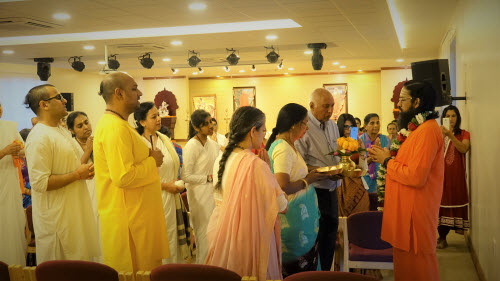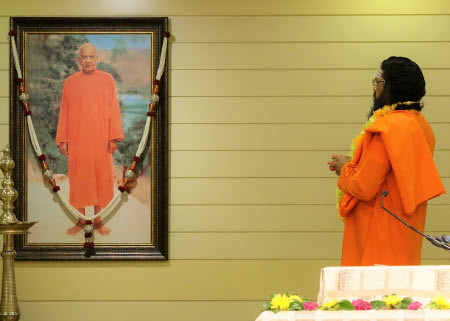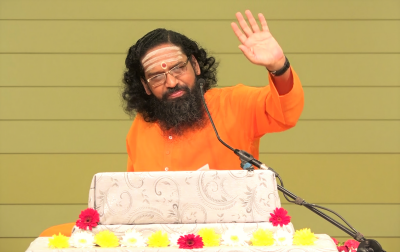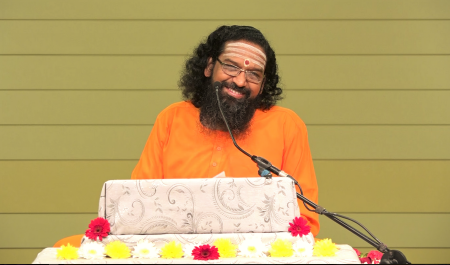Yagna on ‘Narada Bhakti Sutras’ – Part 3 Jan 2017
Talks on “Narada Bhakti Sutras” – Part 3 – by Swami Abhedananda
(Gyan Yagna conducted from 1st Jan till 6th Jan, 2017)
Key Points from the Discourses
Day 1
Devotees at Chinmaya Mission Durban were ushered into the new year by Swami Abhedananda with the devotional discourse on the Lord’s glories. It was the first day of the monthly yagna on ‘Narada Bhakti Sutra’ at the ashram and Swamiji elucidated on having the right paradigms for our love of the Lord & the measure of real success in our life. Here are a few excerpts from the discourse:
- We all have the capacity to believe. Our joys and sorrows are nothing but our beliefs expressed in some or the other form. We are attached to someone because we have a belief that the person will be with us for a long time; we don’t like someone because we believe that the person is bad. Starting from our house to our relatives and to all our belongings, we have a strong belief that ‘they are mine’. We have a tremendous habit of thinking someone and something as ours, but what we fail to realize is that the belief on people and objects is sooner or later disturbed and taken away.
We don’t understand that Lord gave this power of believing so that we can use this power for the Lord alone! - If the power of belief is used to believe in God, then a person becomes a saint. Saint is the one who has my-ness in God, while worldly person is the one who has my-ness in worldly objects and people. If we think of God as ours, the first thing that happens is – our source of trouble is gone. The second thing that happens is – a big source of joy opens up because we experience the love of God.
Our my-ness on the Lord comes when we have seen our life, and we have realized that the people and situations don’t stay with us forever and the one whom we can always hold-on to is the Lord alone.
Success of Life:
- Any relation is intense when there is a lot of giving involved. If you give your love to Lord, will He not feel intensely related to you? If you give your time to God, if you give your sweet words to God, will the Lord not feel that you are His? Success of life is – creating a thought in the Lord that ‘This jeeva is mine’.
- Going to the Lord and sitting near Him is called ‘Upasana’. If we simply go and smile at the Lord, will the Lord not think, ‘What can I give to you? What can I do for you?’ Bhakti is creating an emotion of my-ness for me in the Lord. Unless our heart is offered to the Lord, it won’t lose it’s anger, desires, hatred etc.
- Our earning is not how many people we know and how many contacts we have, but our earning is how much contact we have with the Lord, our earning is how fast He comes to us when we chant His name.
- Our real earning is how much the Lord waits to see us. Bhagwan Ram used to wait for Tulsidasji to do his puja. Meera bai’s Giridhar Gopal used to wait for Mira bai to come and adorn the murti with flowers. Devotees are such that they make the Lord thirsty for them. This is the true progress. Our wealth should be measured in the terms of how much we can sacrifice for the Lord, how much we can work for the Lord, how much we can laugh, cry, dance, sing and think for the Lord. All these are mentioned in Narad Bhakti Sutra. Let us know enter into the sutras of this beautiful text.
Sutra 65:
- Our whole intention should be “what can we gift the Lord today”. Success is nothing but the one whom we need the most, He remains pleased with us. We must understand that this life should not be given for the enjoyment of the ego but all our actions should be dedicated to the Lord.
- One should not be afraid of Kaam. Desires are not bad, it is the object of the desire that makes it bad or good. If we have desires, we must direct it towards the Lord. If you want to shake hands take Bhagwan’s hand and shake; if you want to embrace someone then embrace Bhagwan.
- The word ‘Tasmin eva’, in this sholka is very important. It means, ‘For that Lord only and in that Lord only’. If you have anger, get angry with the Lord; if you have greed then have the greed to do more Japa and chant more stotras. If you want to compete, compete with yourself to do better sadhna. If you have abhiman, have the abhiman that ‘I belong to the Lord’. In other words, even negative emotions when connected with the Lord become positive.
Sutra 66:
- One must never limit himself in seva. In seva one cannot say, I will do only this work and not another. One must be like Lakshmanji who was available for Bhagwan Ram for whatever that was needed. When required, he became a listener for Bhagwan in Pushpa vatika, built a cottage for the Lord, cleaned it with a broom, and even wiped the tears of the Lord. This is one meaning of “Tri-rupa-bhang-purvakam”, the other meaning is- the one who is beyond Sattvik, Rajasik and Tamasik states.
- “Nitya Daas” – A devotee is the one who constantly feels that “I am the servant of the Lord”. This should be our identity. The moment we think we are the servant, our immediate thought is how can we serve. And a servant is the one who finds a way how to serve. The joy of giving is more than the joy of taking. The joy of reducing ahankaar is more than the joy of living with ahankaar. Secret of happiness of a person is, his desires become so small that they are not seen infront of the bigness of the Lord. Those alone are happy who have reduced their egos and all sad people are those who try to become big somewhere.
- “Nitya Kanta” – the constant feeling that ‘I am the wife of God’. This was the feeling that Meera and the Gopis had. They wanted to be the Lord’s wife, because as a wife they could serve the Lord better. As a wife they could offer more to the Lord. Gopis had deeper kanta bhaav for the Lord than His own wives. Their desire was to dissolve in the Lord. Our whole attempt should be, that we become – “of the Lord, in all ways, in all means and at all times”!
Day 2
On the second day of the monthly Gyan Yagna, Swami Abhedananda talked at length on the Love of the Lord, on how it eludes most people and how unbelievably magical it makes the lives of those devotees who are soaked in it. Below are a few nuggets from the discourse:
- We feel that our family, wealth, house and other possessions are important to us, but we don’t think that God is equally or more important. For most us, God is just a means to fulfill our worldly desires. And therefore the irony of life is that when God is not important, one has to carry all the burden of his life alone.
- When a person is loved by God, his life becomes a smooth sail; he knows that he doesn’t need anybody else’s love. There is a constant mental assurance from the Lord that ‘I am there for you. You are not alone!’
- Another irony of our life is that – we want the love of our spouse, children, mother, father, etc. but we don’t want the love of God. Have we ever given a thought whether the Lord loves us or not? Unfortunately, our attention never goes there. The highest attainment of love is that we should be loved by the Lord.
Experiencing Love of God:
- The one who starts feeling a lot of love from God or Guru, he becomes a saint. When you experience a lot of love of your Lord, you become quieter and there is no need to seek attention or importance from anyone else. The success of our life is getting love from God, and the day we start thinking that we should have loved the God more, our love for Him increases.
- When Bhagwan loves you, He takes care of you, He is able to feel your pain and He is ready to do anything for you. He is the one who can take away all your problems. Don’t we need attention from God and interference from God in our life? Sometimes when the mind is broken or shattered, it is the Lord alone who talks to us from inside.
- When one has a lot of experience of Lord’s compassion, he wants to give himself to God. That Lord who gives us so much, when your heart melts for Him and you feel, ‘Can I also do something for the Lord? Can I offer myself to Him?’ then you become a devotee. Then you feel that you are not responsible for anybody in this world except the Lord. You don’t bother what people say, good or bad, harsh or soft.
Sutra 67: Goal of a devotee’s life
- The devotee of the Lord is like cooked rice, which is soft and shiny, unlike the uncooked rice which is hard and difficult to digest. The softness of the devotee means that in front of the Lord, he wants to be defeated and he wants Lord’s opinion to prevail over his opinion.
Sant Namdeva, once when his house was on fire, started pouring ghee on the fire. People asked him why he was adding ghee to the fire instead of water. He replied that, ‘Lord’s wish is to burn my house and has taken ‘Agni Avatar’ for it, hence I am working as per His wish.’ He started singing bhajan and kept pouring ghee. At the end, his whole house got burned down. Seeing his plight, Lord then took the form of a mason and started making a house for His devotee. Such is the glory of devotees! - “Ekaantino” – means that the Bhakta loves the Lord alone. When the devotee experiences that God loves him, he tells to God that his life is Lord’s life and everything is for the Lord alone. He does not want to keep any options for himself. When we give all our options to the Lord, then that is called ‘Ekaantino’. Ananyata (single-pointedness) is needed for loving the Lord. Loving the Lord should be the main goal of our life (Bhaktah ekaantino mukhyaha).
Sutra 68: Love of Lord’s devotees
When the devotees talk to each other about the Lord, they are choked with emotions. Even when we love some worldly person who has given us great joy, while describing about such a person, we tend to get choked with emotions. Similar is the condition of the devotees when they talk about the Lord.
When Sudama was asked by his wife to describe his meeting with the Lord; overwhelmed by the thought of Lord’s love he could hardly talk. Similarly, when Bhagwan Krishna disappeared during Raas leela, the Gopis started singing the Gopika Geet and at the end they all started crying badly. This is Bhakti. Such are the devotees who purify their families and the earth itself.
Sutra 69: Glory of Saints
- The teerthas (holy places) are made by the saints alone. A temple is made by a murthy (idol) but murthy is made by a saint only, if a saint has not worshipped the murthy then the murthy does not glow. The Badrinath murthy was worshiped by Bhagwan Shankaracharya while the Kedarnath murthy was worshiped by the Pandavas. Places like Dakshineshwar and Sidhbari were present earlier also but they became known only when saints lived there. A place is not known by how big the buildings are, but by the saint living there. With a saint, a building transforms into a temple. A saint himself is a moving temple because he has a live God in him.
- “Satkarmi kurvanti karmani”- it is the saints who sanctify the actions. In a Saint’s heart Bhagwan is wanting to seek orders. Saints are very powerful because the Lord Himself is behind them. Ordinary people are after the Lord but saints are the ones behind whom Lord Himself is!
- “Sashastri kurvanti shastrani” – Saints are the ones who make the scriptures appear as they are. Gita is Gita because saints have written commentaries on it. Hanuman Chalisa has the power, not because of Hanumanji but because of Tulsidasji. It is Tulsidaji who had declared, ‘anyone who will chant hanuman chalisa 100 times he will have lot of grace of God’, and therefore to fructify what the Saints have said, these shlokas have the power. This is the glory of saints.
- If one such saint comes in our life, our life becomes quieter and purified. This is the Shakti of a saint. Saint is the one who remembers the Lord, does His bhajan, and pleases Him. And when the Lord is happy on someone, He wants to offer everything to that person, this is true in the case of saints.
Day 3
Nectarine devotional satsang by Swami Abhedananda continues at Chinmaya Mission Durban in the monthly gyan yagna. On the third day of the yagna, Swamiji beautifully elucidated the many aspects of devotion and the characteristics of devotees. Below is a synopsis of the discourse:
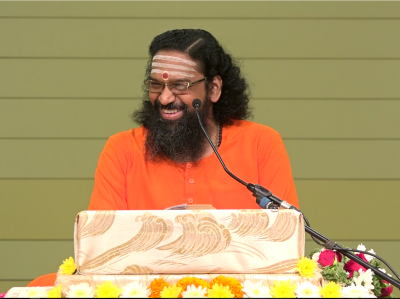 Giving the Right Place to God:
Giving the Right Place to God:
- In life, if we give the right place to the right work at the right time, our sorrows would be lesser. The issues which don’t deserve a place, we sometimes give them a big place. The matters which require more importance, we sometimes do not give them the right importance. The question that one needs to ask oneself is –The God from whom we derive our existence, have we given the right place to Him or not?
- If we analyze our life, we will find that God has given us more than what we deserved or even thought. We should also give to God what He deserves. We think that the worldly people deserve our love; our spouse, children, friends, but does God not deserve our love? Should we not make God happy by sitting with Him, by laughing with Him? Do we ever think how to make the God smile?
- Real giving is not of the external objects, it is the giving of thoughts. We all have a lot of good and beautiful thoughts but we hardly give any thought to the Lord.
- Love comes when there is a pain of not loving enough. The mother of love is the pain of not loving the Lord. When a person has such pain, he prays day and night – ‘Oh God! Can I love you more? Can I offer myself more? Can I do something so that you are happy with me?’
Evolution of a Person:
- The evolution of a person is not the evolution of his status. Evolution of a person is not that his children get married, or he gets increment in job; all these are worldly matters. Evolution of a person is how much he feels for the Lord, how much he identifies with the Lord, how difficult it is for him to live separately and think separately from the Lord.
- We live in the Lord’s house and we are worried about our pity things in our life. Worrying only means that we don’t have faith and trust in God. We should not make our problems bigger than the Lord and our sorrow bigger than Lord’s happiness. God doesn’t like to see us unhappy.
Let us now think about the Lord and His devotees through the sutras of Narad Bhakti Sutra:
Sutra 70: Fully Absorbed in the Lord
- ‘Tanmayaha’ – means devotees are full of Lord. When the thought of Lord dominates, they forget their own self; their ‘aham vritti’ is dominated by the ‘idam vritti’ of the Lord. They don’t know what they are doing.
Like Bharatji, while going to Chitrakoot, used to get so overwhelmed by the thought of Lord Ram that he didn’t even know where to go. When Nishadraj showed Bharatji the place where Bhagwan Ram rested in the night, Bharatji fell and rolled on that ground seeing the sign of Lord’s feet and the fallen pearls from Sitaji’s ornaments. Constantly chanting the Lord’s name, Bharatji used to say, ‘I am surrendered to the sandals of Lord Ram!’ This is called Tanmayaha. - The moment you give yourself to the Lord, you forget yourself. Just as, when you are absorbed in some work, the work overtakes you. Gopis are another example of Tanmayaha. While selling butter, instead of saying ‘Makhan lo, Makhan…Take butter, take butter’ they would say, ‘Madhav lo, Madhav…Take Krishna, take Krishna!’ They used to get almost stupefied when the Lord used to hide while doing Ras-leela with them.
- Another example is Mother Yashoda – When Bhagwan Krishna held the Govardhan parvat for seven days, everybody rushed to touch and embrace Him, but Mother Yashoda couldn’t go because she was standing still in wonderment without any movement; no other thought was in her mind except for the thought of her Krishna.
Sutra 71: Devotees spread happiness and fulfilment
- When an individual becomes a devotee even his ancestors are overjoyed. When Prahaladji pleaded to Narsimha Bhagwan to give a good abode to his father, the Lord smiled and declared ‘The families in which devotees like you are born, 21 generations get emancipation and with devotees like you even the insects will get purified’. The glory of God’s devotees is such that the whole earth gets sanctified.
- It is said in the sutra that even the devatas are happy with a devotee. Any dharmic work done pleases the devatas. When we go for darshan of the Lord, the devata of the eyes called Surya is very happy, when we do Puja, devata of the hand called Indra is very happy; when we go to some teertha, the devata of the feet called Vishnu is very happy and when we chant stotras, Saraswatiji is very happy.
Sutra 72: Bhakti is for all
- There is no distinction or Bhed in Bhakti. To study Vedant one has to be an adhikari (eligible person). But in Bhakti there is no eligibility or Jati required. To love one does not need anything. Great saints like Namdevji was a tailor, Tukaramji was shudra, Kabirdasji was a weaver, Gora-kumbhar was a potter, and they all attained God, only by chanting ‘Vitthal Vitthal’.
- The requirement of knowledge is also not a criterion for Bhakti. In Ramayana, Jatayu (the vulture) had no knowledge; but the Lord addressed him as father and even performed his last rites. The tribals of Chitrakoot and even Kevat (the boatsman) who were considered as untouchables were all embraced by the Lord.
- Roop also is not a criterion for Bhakti. A monkey has no beauty but the Lord touched each monkey’s head and inquired about their well-being before leaving for Lanka.
Sutra 73: Saints belong to the Lord
If somebody is very good, we feel like possessing that person. Similarly, when Bhagwan sees the saints He too feels that the devotee is mine only. The feeling of myness does not come for all, it develops only for the one who has done a lot for us, who has served a lot, who has offered a lot. Bhagwan had this feeling intensely for mother Yashoda and the Gopis. The success of a devotee’s life is that Bhagwan thinks that he is mine!
Day 4
On the fourth day of the monthly yagna, Swami Abhedananda lovingly explained to the devotees how to establish, strengthen and sustain their relation with the Lord. Below are a few excerpts from the discourse:
- In life, we all need some relationships to rely on. We need such relations which would never leave us even after knowing our shortcomings and weaknesses. We need some relation who would never cheat us or hide anything from us. We need someone who can remove our ignorance and correct us lovingly when we make any mistake. We need someone who can teach us how to be selfless, quiet, and free of anger.
No human being or jeeva can ever fulfill all these needs. Such a relation can be fulfilled by none other than the Lord! - All worldly relations are meant to leave, they are meant to give some or the other pain in due time. This is the hard truth. World is not meant to give our heart to; it is not meant for our indulgence. If we look closely, we will find that wherever we enjoyed a lot, that place alone became the cause of our unhappiness.
It is our innermost need to be related to someone, we want to give our best and want to offer our heart to someone. We have such a good mind and a beautiful heart; why give it to the worldly people, why not give it to the Lord? Why not offer ourselves to the Lord and say, ‘Oh Bhagwan! I need you. Without you I am lonely’.
Getting connected to the Lord:
- Loving is not a part-time job. Gopis were not loving Lord Krishna only in the mornings. Whole day and night, they used to remember Him. Such was their devotion.
- Life is not meant for throwing away on small matters. Life is not meant for getting attached to one or two places or people. Life is not meant to just earn money, eat, involve and sleep. Life is meant for loving the one who gave us everything, who gave us our soul!
- Our heart should be meant for the Lord alone. Sometimes we should just sit in front of Lord and talk to Him. We need not be formal with him, just be casual! More is the love, more one becomes casual. Take the Lord in your hand, embrace Him, and ask Him repeatedly, ‘Oh Lord! I am your servant. What can I do for you? Please tell me some seva.’ This is how relation with Lord can become dense. Claim your real love. That is called fulfilment of life.
- When we realizes that God is the one who has loved in our thick and thin, who gave everything that was needed, who saved our honor many times, who protects us at every moment; then we want to go close to that God!
How can we increase our Bhakti for that Lord? Let the sutras of Narad Bhakti Sutra show us the way:
Sutra 74 & 75: Refrain from Arguments
- These sutras give instructions to the devotees that – One should not fall into arguments. One should not have friction with anybody. When a person doesn’t have ego, his life is very quiet. It is the ego that wants to supersede others.
- ‘Aniyatatväccha’ means arguments don’t take the conversation to any conclusion. There is always a big scope of involving into various kinds of arguments, and some people are very argumentative and they discuss a lot about every small issue. When a person is very argumentative by nature, people are very discouraged to talk to him because they know that he would keep on replying and never listen to others. Thus, one should be careful not to indulge into any argumentative debates.
Sutra 76: Learn & Enliven the Bhakti Shastras
- We should constantly contemplate upon the Bhakti Shastras. Everyday we should read a little Ramayan, Bhagwat or some Puran so that our mind gets good thoughts to contemplate on.
- We may not know about a person unless we live with him, similarly to know about the Lord we must go to Ramayan which is the house of Lord Ram (Ramasya-ayanam). Unless we go to Ramayan everyday how will we know how Ramji lived, how He interacted with His Guru, What was His reaction when His mother asked Him to go to the forest. Similarly, unless we read the Bhagwat how will we know, how was Bhagwan Krishna. We must therefore do the mananan of the Bhakti Shastras.
- We must do only such actions which inspire the Bhakti in us. We all have our own Ishta devata, dream that one day that Ishta devata will come to you, and imagine how will you welcome Him and serve Him. Dream! Everyday discover new ways to express your love to the Lord. Be sure that a day will come when the Lord will be pleased with us and will surely come to us.
- Do not stop Japa and Puja only because the mind runs, but do them because the Lord is pleased with them. Even when you dress up, tell the Lord you are dressing up for Him and see what joy comes. When we start doing for the Lord, Lord too shows His glory and leela to us. He shows His love for us. Even when you experience pain, consider it as a Prasad from the Lord. It is only the Devotees who can divinize every situation!
Day 5
The Ganga of devotion continued to flow as Swami Abhedananda shared the secrets of getting closer to the Lord and remembering Him constantly. Below are a few must-read excerpts from yesterday’s discourse:
- When someone asks us whom we live with, or whom we belong to, we immediately list the names of our family members, our father, mother, spouse, child etc., but do we include God in that list? Inside our mind, does the answer come that ‘I live with my Lord. I belong to my Lord’? Those who become devotees, their answer includes God’s name. Our introduction should have a place for the God.
- A time comes in a devotee’s life when he doesn’t want to be introduced by worldly relations, he wants to be introduced only as Lord’s relation. A time comes when the devotee doesn’t bother who is living with him or not living with him. He feels that the Lord is with him at all times, walking with him, eating with him, talking to him. Lord becomes an inseparable quotient of his life.
- We all have some relatives whom we love, and for remembering them we don’t have to put any efforts. But when it comes to God, we need a japa-mala to remember Him. Remembrance of God should be spontaneous and effortless!
- Let us love the Lord and enjoy. The life of love is wonderful! Mentally keep on asking the Lord if you belong to Him or not. Mentally keep on touching His feet. Mentally keep on saying, ‘Oh Lord! I have no one else other than You.’ We don’t deserve His attention but still He keeps caring for us, supporting us and loving us.
Sutra 77: Valuing our Time
- It is said in this sutra that – One should not waste his time and patiently endure till the state comes when he can put aside material happiness, sorrow, desires, and gains. One should have a spiritual goal in his life; he should have a dream that – some day he will have no anger even if somebody beats him or abuses him; he will have no desires and no expectations from anyone.
- From the childhood we are forced to entertain wrong dreams such as – you should grow up and become a wealthy person, have a lot of power; you should marry, and go to foreign countries, you should become a handsome boy, or a beautiful girl, so on and so forth. These are the desires fed to us from childhood. But no one tells us to become a person who is spiritually evolved, who is quiet, who has no attachment, no demands, and no ego.
- Devotees have Lord as their goal; they are not satisfied by worldly things. One should not be satisfied just because he has a good son, or good job or wealth, one should keep going till his spiritual goal is reached. Like holy Ganges rushes to the ocean till it meets the ocean, we should also not stop till we meet our Lord.
Sutra 78: Essential virtues
- Ahimsa (Non-violence): Ahimsa means ‘not hurting anyone’. If we hurt someone and then do Puja, such a Puja is not accepted by the Lord. When a person thinks bad about someone, his thoughts travel to the other person. There may not be any connection outside but inside a highly negative connection exists. If a person does not have Ahimsa he is not dear to Lord and if he is not dear, Lord doesn’t give him inner fulfilment and inner joy.
- Satya (Truth)- Satya means ‘not speaking false’. There are two factors due to which a person speaks false; either he wants to cover his negativity, or he wants to show something which he doesn’t have. Speaking the truth makes the Lord very happy, and when the Lord is happy He gives us the power of loving Him, He gives the emotion to go to Him, He gives us the power to call Him. For some petty gains, we must not leave a bigger gain. For some cheap achievements, we must not leave a bigger achievement. Even if we lose something, at least we will have the love of Lord, this is our earning.
- Sauch (Purity) – Sauch means ‘purity of body as well as purity of intentions’. We must not have bad emotions for anybody, even if they have done wrong to us. God knows our inner core emotions. Hardly 1% or 2% of our thoughts are known through our actions and behaviour, but there is a lot going on in our head. It is only the Lord who knows all. He knows whether we are speaking the truth, and what are our intentions. So, it is essential that we maintain Saucham.
- Daya (Compassion) – One should have a lot of compassion. If compassion was not there, no teacher can be a good teacher, no mother can be a good mother. Behind the smile of every person is someone’s compassion on him.
- Aastik (Theist) – Aastik means ‘having faith’. We should have faith that everything will be taken care of by the Lord and we are simple His instruments.
Sutra 79: Remember Him always
- This is a very beautiful sutra, it says that – one must remember the Lord ‘Sarvada’ (at all times), ‘Sarva bhavena’ (in all ways) and ‘Nishcintitaihi’ (by not worrying). When we are already with the Lord then what is the need to think or worry about anything else. Just pray and do His bhajan.
- Bhajan means, trying to please the Lord in all ways. Thinking about His leelas itself is His bhajan. Life is not meant to squander away; it is meant to give joy to the Lord. Once a while, take a piece of paper, divide it into pieces & write on those pieces “Oh Lord, I love You a lot!” and do archana with it and offer to the Lord. Bhajan means finding new ways how to make the Lord happy, and to express our love!
Day 6
On the last day of this month’s gyan yagna, Swami Abhedananda compassionately explained the many types of Bhaktis and how the Lord unfailing tends to the ardent devotee when he calls upon Him. With the successful completion of the monthly yagna, the effulgent glory & joy of devotion got rekindled in the hearts of the listeners. Below are a few take aways from the discourse:
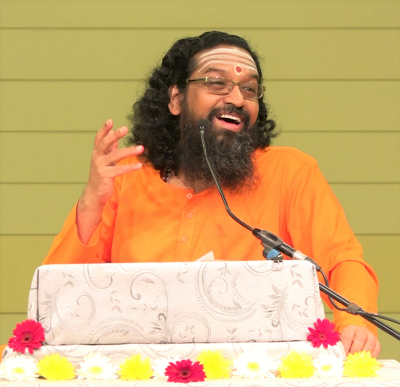 Gratefulness towards the Lord:
Gratefulness towards the Lord:
- In our life, many people have played important roles, starting from our mother, father, teachers, but if there is someone who has done the most, its the Lord. If something good came through to us, it was God’s expression to tell that He loves us. If there was something undesirable or bad that we got, it was also a call from the Lord telling us to leave some attachment and go to Him.
- When this realization sets in that Lord has planned a lot for us, has done a lot for us, then we also want to do something for Him. When the emotion of gratefulness develops in our heart, we cannot stop loving the one who gave us so much.
- Every day the Lord calls us in various ways, we should not fail to hear His call. A Sadhu is the one who hears the Lord’s call every time, day and night, guiding him at every step.
Sutra 80: Glory of Keertan
- It is written in this sutra that when we do Keertan of the Lord and call Him, He manifests immediately in a way so as to provide His experience. While chanting Lord’s name, each pour of the body should call Bhagwan, as if saying, ‘I want You urgently!’ This urgency in taking Lord’s name is called Keertan. And He does come! That is how Draupadi and Gajendra had called the Lord.
- Keertan can be done at any place, and at any time. When you chant Lord Krishna’s name, remember a Gopi chanting ‘Krishna’. When you chant Lord Ram’s name, think how Dashrathji, or Sitaji or Lakshmanji would have called Bhagwan Ram.
Bhagwan loves to hear His devotees call. Like Bhagwan used to appear in front of the Gopis, Bhagwan can come in front of us too.
Sutra 81: Glory of Bhakti
- It is said here that – Bhakti is the highest truth. It is highest because it lifts us. The dirtier a child is, the more anxious his mother becomes to pick him and clean him. Similarly, when we go to Bhakti, it cleanses us and purifies us. When we go to God after doing any mistake and seek forgiveness, He graces us, He lifts us. Bhagwan never leaves us. This is the glory of Bhakti!
- In our life, Bhagwan has saved us at many occasions otherwise we would have been torn by various storms that came at us. Therefore, it is said here that Bhakti alone protects. Leave anything except God. Leave any person except God.
- Take the Lord’s name when you get angry; take Lord’s name when you get desires, and you will see the glory of Lord’s name, all anger and desires would be gone. All sins are gone because of Bhakti. Call Him everyday!
Sutra 82:
11 kinds of Bhakti are told in this Sutra:
- Guna Mahatmya:
One should be fond of remembering the guna and leelas of God. We must try to contemplate on how Bhagwan Krishna talks to Gopis, and Gopas, how He feeds the Gopas when they go to the forest for cow grazing. Repeat the friendliness of God in your mind. The qualities of bhagwan are vast. - Roop-aasakti:
Roop- aasakti means being fond of remembering the form of the Lord. The form of the Lord was extremely beautiful, His eyes glistened all the time. Even the peacocks started dancing in joy, when they saw Bhagwan Krishna. In Mahabharata war, those enemies who came to shoot Arjun, got captivated looking at Bhagwan Krishna and missed their shot; that is when Arjuna shot them down. - Puja-aasakti:
Puja-aasakti means the desire to give to the Lord. When you love someone, don’t you have the desire to give, to feed Him and to offer something. You may give sometimes without loving but you cannot love without giving. When you offer incense sticks to the Lord, say to the Lord that this is for you, please accept it. Sometimes when you give naivedya, dance in front of the Lord and sing some beautiful song for the Lord. That is called Puja-aasakti. - Smaran-aasakti:
Smaran-aasakti, means attachment by remembering the Lord. We remember only those towards whom we have my-ness, where we have joy in remembering. Like you don’t have to remember your child, remembrance comes automatically, similarly in Smaran-aasakti there is constant and automatic remembrance of God. Through Smaran-aaskti, you forget the world. - Dasya-aasakti:
Dasya-aasakti means attachment to the Lord by being His das (servant). A das has only one thought in the mind and that is, how I can give more. To please the Lord, he is ready to laugh, dance, sing, make food, meditate or even renounce. You need not be told, those who want to serve, they find some way to serve. That is called Das ya bhaav. - Sakhy-aasakti
Sakhy-aasakti means attachment to the Lord by being His friend. Bhagwan Krishna’s Gopas are a great example of this. When Bhagwan used to graze the cows, sometimes the cows got mixed with the other cows of Gopas, the Lord then lovingly grazed all their cows as well. - Kanta-aasakti:
Kanta means wife. Gopis had the bhaav of wife towards the Lord. A dedicated wife is very close to the husband. Here the intention is to give you maximum joy in all ways. In the kanta bhaav there is also dasya bhaav. But Kanta bhaav has some shringaar (adorning) aspect in that i.e. I am your wife. Meerabai and Radhaji had this bhaav. - Vatsalya -aasakti:
Vatsalya-aasakti, means the joy of enjoying the Vatsalya ras (caring for) of the Bhagwan. When Bhagwan used to come back from the forest, Yashodaji used to make Him sit, and feed Him. She had only one Krishnakaar vritti day and night, constantly thinking how to make the Lord happy. - Atmanevedan-aasakti:
Atmanevedan-aasakti means one who offers everything to the Lord. It means surrendering onto the Lord devoid of ahankaar. Gopis, Bharatji and Lakshmanji all had this bhaav. - Tanmay-aasakti:
Tanmay-aasakti, means being totally lost in Lord. Sarbhang rishi, had this tanmayta, he also got totally intoxicated. The devotee is overwhelmed and overtaken by only one thought, the thought of the Lord. - Paramviraha-aasakti:
Paramviraha-aasakti, means one who misses the God a lot. Is it possible that you love someone a lot and you don’t miss Him? We must all try to miss the Lord at least little.
Sutra 83:
These sutras on Bhakti have also been expounded by the great saints like Sanak, Sanatan, Sanantan, Sanat-kumar, Vyaas, Shukdevji, Shandilya, Garga, Vishnu Bhagwan, Shesh Bhagwan, Udddhav, Aruni, Daityaraj Bali, Hanuman, Vibheshaan etc, who share the same opinion about Bhakti.
Sutra 84:
Naradji must have heard these sutras from Lord Shiva, therefore it is said in the last verse – ‘Shiva-anushasanam’. Shiva here also means auspicious. One who follows these Sutras, who believes in them and one who has faith in them, they will attain God.
Life is meant to be given to the Lord alone. We have given so much of time and energy to so many people, can we not give the remaining of our life to God. Keep on praying to the Lord – “Make me worthy of you, snap all my negativities, snatch my mind and take away my attachments”, Bhagwan will surely give you devotion.
May this Narad Bhakti Sutra give us lot of devotion and may the Lord be happy with us!



